- Home
- Sue Grafton
Y Is for Yesterday Page 16
Y Is for Yesterday Read online
Page 16
• • •
In the car on the way down the drive, Joey said, “What did you think of that discussion about Austin?”
“Being dead or alive? I don’t know how you could prove it one way or the other. What’s your take on it?”
“Beats me. I never even knew the guy. Here’s what occurred to me. If we were clever, we’d create a diversion.”
Iris looked over at him. “Like what?”
“We need a shadow suspect. A stand-in for the blackmailer. Someone other than us.”
“Nobody thinks it’s us.”
“I’m saying we conjure a boogeyman. That way, our fearless girl detective can forget everything else and chase after him.”
“Who’d you have in mind?”
“Who’s the obvious candidate?”
She looked at him for a moment. “Austin.”
“There you go,” he said.
“Why do anything?”
“Because Fritz has gotten complacent.”
“No he hasn’t. He’s scared shitless, crying in his beer because his mommy and daddy won’t pay up.”
“Yeah, but what’s he doing about it? Fuck all. We need to remind him how much trouble he’s in.”
“Ha. Like he doesn’t know that already.”
“I’m saying reinforce the threat. Put the squeeze on him. I’ve been thinking about it and I have it all worked out. We call and leave Fritz a message on the answering machine—”
Iris interrupted. “How do you know he won’t pick up? Or his parents?”
“If they do, I hang up and try again another time. When I get the machine, I can make it sound like it’s Austin. ‘This is a voice from your past. I’m tired of screwing around. You either get the money or else.’ Something to that effect. Fritz just said if Austin were alive, he’d be in touch. He hears that message and he’ll assume it’s him. Those recordings distort voices anyway, so that will work to our advantage. I’ll give him instructions for where to deliver the money and then we’ll get this show on the road.”
Iris said, “There’s no point telling him where to deliver the money when he doesn’t have it.”
“This is to light a fire under his butt. Get him motivated. Otherwise, what’s his incentive for doing anything?”
“Come on, Joey. What’s he supposed to do? It’s obvious his opinion carries no weight with his mom and dad.”
“Not our problem. That’s his to work out and he better hop to,” Joey said. “It’s time to remind Fritz how much he stands to lose.”
“So what are these instructions of yours? I’m dying to hear.”
“He needs a deadline. Something concrete so this doesn’t drag on and on. I’ll say someone’s going to pick him up somewhere downtown. Give him a day and time. Then we can drive by the location and check to see if he’s cooperating.”
“And if he’s not?”
Joey shrugged. “We try something else.”
“You know what? So far, this feels like we’re just making shit up as we go along.”
“It’s called being flexible. If he comes up with the dough, we’ll come up with a plan.”
“You better think about it in the meantime.”
“Baby, that’s all I do.” He looked over at her. “It’d be funny if this worked, wouldn’t it?”
She smiled. “I don’t know about funny, but it would be a hoot.”
13
Wednesday afternoon, September 20, 1989
I ate lunch at my desk, trying Poppy’s phone number at intervals to no avail. In the afternoon, to fill my time, I took the index cards out of my bag and typed up my notes, making a display of productivity to soothe my conscience. I was no closer to finding the McCabes’ extortionist than I’d been at the outset, and the lack of progress undercut my confidence. I was entertaining a teeny tiny wee regret that I’d agreed to the job in the first place. Whatever the problem, a desire to be helpful is a risky proposition, a lesson I never seem to learn.
At five, I closed up the office and headed home. Traffic was light through the downtown streets and I was on Albanil, searching for a parking place, when a little red Mercedes-Benz convertible whizzed by. I turned my head in time to spot Cheney in the driver’s seat and I felt a small jolt of happiness. Then I saw his passenger, the way-too-pretty Anna Dace. As I watched, he slowed and turned onto the parking apron in front of Moza Lowenstein’s garage.
He killed the engine, got out, and walked briskly to the passenger side, where he held the door for Anna as she emerged in a long white sweater and a skirt so short, it scarcely covered her underpants. His expression was grim. She kept her head down, dashing tears from her cheeks as the two proceeded to Moza’s front door. Neither seemed aware that I was in range, which suited me just fine. Anna took out her house keys and let herself in. She and Cheney chatted briefly through the open door and then he returned to his car and drove away. I hoped the poor dears hadn’t had a lovers’ tiff.
I changed clothes and went for my run, reflecting on life and love while my thigh muscles protested, my chest heaved, and sweat collected at the small of my back. As is true of so much in life, it was none of my business if the two of them had embarked on a relationship. Furthermore, if they quarreled, that wasn’t any of my business, either. I hadn’t planned to go to Rosie’s that night anyway and I certainly wouldn’t do so now. What if I were there and the two came in for dinner? Was I going to sit pretending not to notice while they kissed and made up or stared soulfully into one another’s eyes over plates of Rosie’s peculiar food? No, I was not.
I finished my three-mile stint and then used the three-block walk home to cool down. I passed through the gate and proceeded to the backyard. No sign of Lucky or Pearl, so I headed for Henry’s back door, which was open to the late afternoon air. I knocked on the frame, tilting my head to the screen. “Hey, Henry? You there?”
I heard “Yo!” but the voice wasn’t Henry’s. It was Pearl’s.
She came thumping into the kitchen from the hall, swinging her bulk between her crutches. She’d wrapped herself in an enormous apron. I watched her hump herself over to the back door and unlatch the screen. I stepped into the kitchen, noting the big pile of dirty dishes and utensils on the counter. Flour dusted the floor like a light snowfall. Henry’s proofing bowl had been placed on the back of the stove with a towel over it.
“I take it Henry’s not here.”
“Lucky asked to borry his car so he could reclaim his dog from the veterinarian. He’d just sucked down a six-pack of beer, so Henry decided it’d be smarter if he drove.”
“So now we’ve got a dog living here, too?”
“We gotta keep him somewheres. Animal Control was this close to putting him down, so Lucky had to fetch him or the poor thing would be dead.”
“Didn’t he have to license the dog?”
“So?”
“So that cost money. I thought he was broke.”
“Henry lent him the money,” she said. “What’s that sour look?”
“You don’t want to know.”
“I do, too. That’s why I asked.”
“I’ll tell you what bothers me. Having you camp in Henry’s backyard like it’s a national park. The rehab facility wants you indoors with access to a toilet. Not hobbling around in the dirt on crutches, peeing on the few plants Henry has left.”
“Who put a bug up your heinie bumper?”
“It pisses me off that you take advantage of him. When are you going to pay your own way? You have no ambition, no self-discipline, and no skills.”
“That ain’t my fault,” she said indignantly. “I’ve applied for jobs all over the place and no one’ll hire me. It’s discrimination and you know why? I’m a woman past forty and I’m mortally obese. Hey, I’m white and that’s a plus, but otherwise I’m screwed, which the government knows or they
wouldn’t be sending me disability checks.”
“What disability?” I asked, exasperated.
“My hip is broke. Where the hell have you been?”
I closed my eyes, practicing self-restraint. “Once your hip is healed, what’s your disability?”
“I don’t know. Mental?”
“You’re not mental. Get serious. You’re healthy, you’re smart, and you have energy to spare. It’s time to pitch in your fair share.”
“My share of what? This ain’t even my house. I bet it was paid off years ago, so what am I pitching in for? Air and sunshine?”
“Food. Utilities. Washer and dryer. Hot showers . . .”
“I can get all of that for free at Harbor House.”
“Then what are you doing here?”
“Well, I’ll tell you what I’m doing here, Miss Smarty-Pants. I was saving this for a surprise, but I can see I’ll have to let you in on a little secret. Henry’s teaching me to bake. That way I’ll have a skill and I can hire on as a baker’s apprentice.”
“You don’t have the patience.”
“I most certainly do! I’m putting up with you and that big mouth of yours, ain’t I? Anyway, I watched him put a batch of dough together and it’s no big deal. Just yeast, water, and flour. Mix her up, knead her until she’s smooth, and that’s it.”
I moved over to Henry’s bread proofing bowl and picked up the towel. In the bottom was a dispirited wad of ragged flour. “Is this ‘her’?”
“Yep! You set her in a warm place and Nature does the rest.”
I picked up the empty yeast packet lying on the counter. “I’ve got news for you. ‘Her’ is dead. You know the expiration date on this packet of yeast? June of 1984.”
“Well, no wonder! I had to hunt all over and finally found that at the back of the pantry.” She humped her way over to the counter and peered into the bowl. “That don’t look good at all. Guess I better start me another batch.”
“Why don’t you wait until Henry gets home and have him demonstrate?”
“Why can’t you do that?”
“I don’t know how to make bread.”
“Well, I’ll be darned. That’s the best incentive I ever heard. Conquer this and I’ll have me a way to lord it over you instead of the other way around.”
• • •
I let myself into the studio, took a shower, and then dressed. When I came down the spiral stairs, I sat down at my desk and tried Poppy’s number again. I really didn’t expect her to pick up, so when she answered after four rings, my instinct was to hang up. I didn’t want to put her on notice that I wanted to talk to her and I didn’t want to go through the awkward process of explaining my purpose on the phone. I depressed the plunger while she was still saying, “Hello? Hello?”
I got in my car and went around the block, coming out at Cabana Boulevard, where I took a right. She was only four blocks away, which I could have walked in the time it took. The eight cottages that formed her courtyard showed various degrees of domestication—potted plants on one porch, wicker furniture on another. One patch of yard sported a birdbath and another had a weed whacker lying on its side. I imagined a small insular group of folks who minded each other’s pets when someone went out of town.
I knocked and when she came to the door, I said, “Poppy?”
“Yes?”
Her response was so guarded, I thought she was lying through her teeth. She didn’t look much older than twelve, with pale blue eyes, lank blond hair, and pale cheeks overlaid with sunburn. She was so thin the knobs of her elbows stuck out like the wooden couplers in a set of Tinker Toys. The blue cotton dress she wore had cap sleeves and a sash that appeared to tie in back like garments I’d worn in fifth grade. It wasn’t even stylish at the time.
“If you’re selling something, I don’t buy from you door-to-door types,” she said.
“Sorry.” I reached in my shoulder bag and took out a business card that I handed to her. I don’t think I look anything like a door-to-door salesperson, but what do I know? “I chatted with Troy Rademaker and he suggested I talk to you. That’s me,” I said, pointing to my name like she couldn’t read it for herself. “Your stepmother was kind enough to give me your address.”
“A private investigator? What did I do? I didn’t do anything.”
“I’d like to talk about Sloan. I understand you were best friends.”
“Troy told you that?”
“A couple of other classmates as well. Do you mind if I come in?”
“Not until you tell me what this is about.”
“Fritz McCabe was recently released from CYA. You probably read about it in the paper.”
“I don’t read the paper. It’s depressing.”
“Has he been in touch?”
“What business is that of yours?”
This was going to be my punishment for the ease with which I’d extracted her stepmother’s poor opinion of her. I said, “He served his time and now he’s home again. A question’s come up about a videotape he was in.”
She narrowed her eyes. “Did he hire you to come around here asking about that?”
“Not Fritz. I work for someone else.”
“What’s this have to do with me?”
“I was told the tape was in Sloan’s possession shortly before she died. I guess there’s still a chance it’s hidden in her room. The other thought was she entrusted it to you.”
As I said this, it dawned on me (belatedly, I grant you) that it didn’t matter who’d been entrusted with the tape. Maybe Sloan had given it to someone or maybe it was still in her room when her mother closed and locked the door. The tape’s whereabouts for the past ten years wasn’t the point. The point was, who had reason to do Fritz McCabe harm? Who wished him ill and who wanted to turn his newfound freedom into misery?
“Sorry, but she didn’t ‘entrust’ anything to me. I knew she had the tape and I told her I wanted to see it, but she said she’d left it somewhere. She was supposed to let me know when she got it back. She never got a chance. Anyway, right now I’m in the middle of something and I don’t want to take a break.”
Out of the corner of my eye, I picked up movement in her next-door neighbor’s window and I caught sight of the woman I’d encountered briefly on my initial visit. I realized Poppy had offered a response and I hadn’t heard a word.
I said, “I’d rather not go into it standing on your front porch. Your neighbor’s been listening to every word we’ve said.”
She glanced at her neighbor’s window. She and the woman exchanged a look that Poppy held, unblinking, until the woman withdrew.
She stepped back then, allowing me to enter her living room.
She’d filled her small house with an odd assortment of 1940s furniture: heavy blond pieces inlaid with dark laminate. The wooden arms of the chairs had rounded edges and the upholstery was dark plush. The fabric reminded me of the seats in movie theaters when I was a child: short, scratchy nap of some indeterminate color. Usually there were old boogers plastered on the undersides. The area rug was green, tone-on-tone, with a pattern of overlapping leaves.
She went into her small kitchen to the breakfast nook, and I followed like Mary’s little lamb. On the kitchen table, she’d set up a cutting mat, an X-acto knife, a pile of postcards, and a container of a milky substance I assumed was glue.
She’d dissected six or eight postcards, creating strands of color that she affixed to heavy-duty poster board. The design seemed to be abstract except for the occasional reference to one of the fifty states. It was interesting how decorative the word “Ohio” became when it was intermingled with “Wyoming.” Nearby, she had a photograph of Sloan propped up against a cereal box.
I picked up the photo of Sloan and studied it briefly.
“How much have you heard about the tape?” she asked.
“Why don’t you ask Bayard Montgomery? They were big old buddies back then. I was just at a pool party at his house.”
She seemed to be loosening up and I wondered if I could press her for more. She was preoccupied with her project and it seemed to temper her initial hostility.
I said, “I’m not clear about the sequence of events. I remember reading about it in the paper, but that was ten years ago. As I recall, Austin Brown invited her to a pool party at his parents’ cabin up on the pass and things got out of hand. Were you there?”
“Sure, but I left before any trouble set in. Really, everything was fine at first. School was over and everyone was in a good mood. The cabin had a swimming pool and we were in and out of it, playing music and cooking hamburgers and doing stuff like that.”
She used the X-acto knife to tease an area of dark blue from the postcard from Arizona. I could see that she was re-creating the photograph of Sloan in pixels of color, but the image wasn’t clear at such close range.
“Why didn’t you party at Austin’s house? Didn’t he live in Horton Ravine?”
“He wanted privacy. He’d bought a keg of beer and a lid of dope and he didn’t want his parents to know.”
“Who invited Sloan?”
“He did. The way I heard it, she was jogging that morning in her neighborhood. He was with Troy in Troy’s pickup and asked if she wanted to join them. She said she had to take care of her dog and get cleaned up from the run, so Troy said he’d swing by later. Iris and I got there before they did, which was one forty-five or so.”
“I thought Sloan was being shunned,” I remarked, nudging the conversation back to the point.
“She was, but Austin agreed to call it off.”
“Where were her parents all this time?”
“They drove to Arizona to pick up her stepbrothers. The two of them spent summers here with their dad.”
“When you saw Sloan, did she seem frightened?”
“Not at all. It was a party. I didn’t think she was in danger and neither did anyone else.”

 S Is for Silence
S Is for Silence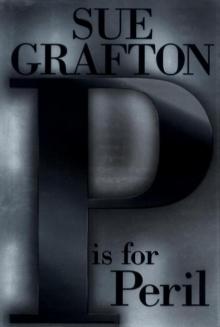 P Is for Peril
P Is for Peril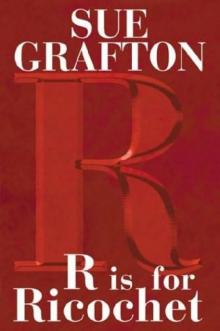 R Is for Ricochet
R Is for Ricochet J Is for Judgment
J Is for Judgment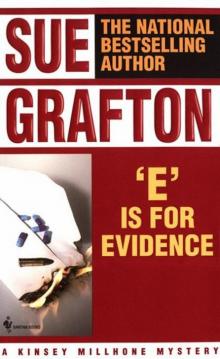 E Is for Evidence
E Is for Evidence T Is for Trespass
T Is for Trespass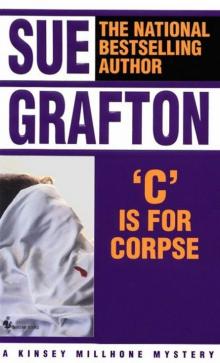 C Is for Corpse
C Is for Corpse U Is for Undertow
U Is for Undertow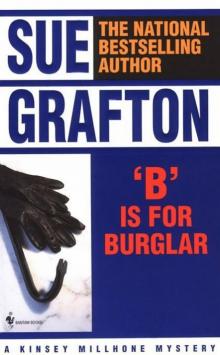 B Is for Burglar
B Is for Burglar Four Sue Grafton Novels
Four Sue Grafton Novels D Is for Deadbeat
D Is for Deadbeat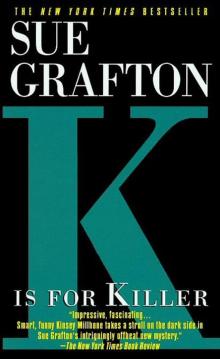 K Is for Killer
K Is for Killer I Is for Innocent
I Is for Innocent A Is for Alibi
A Is for Alibi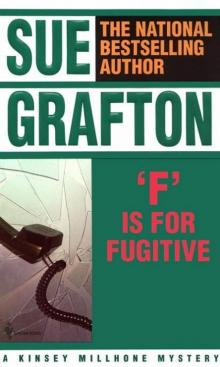 F Is for Fugitive
F Is for Fugitive Q Is for Quarry
Q Is for Quarry W Is for Wasted
W Is for Wasted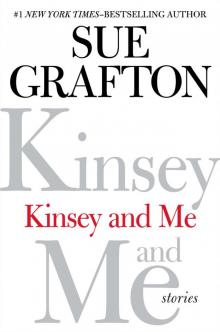 Kinsey and Me: Stories
Kinsey and Me: Stories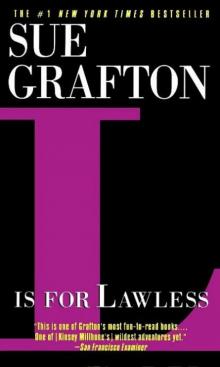 L Is for Lawless
L Is for Lawless Y Is for Yesterday
Y Is for Yesterday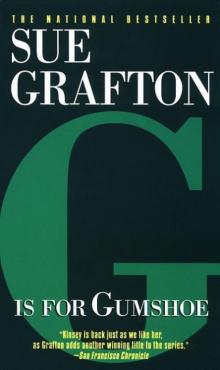 G Is for Gumshoe
G Is for Gumshoe O Is for Outlaw
O Is for Outlaw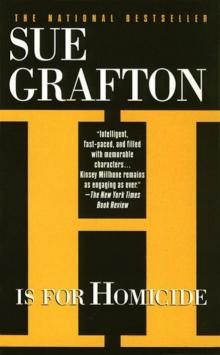 H Is for Homicide
H Is for Homicide X
X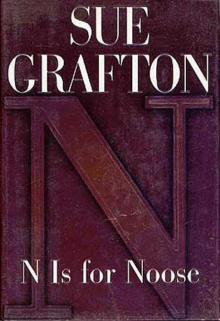 N Is for Noose
N Is for Noose Three Complete Novels: A Is for Alibi / B Is for Burglar / C Is for Corpse
Three Complete Novels: A Is for Alibi / B Is for Burglar / C Is for Corpse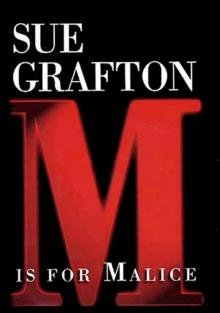 M Is for Malice
M Is for Malice I is for INNOCENT
I is for INNOCENT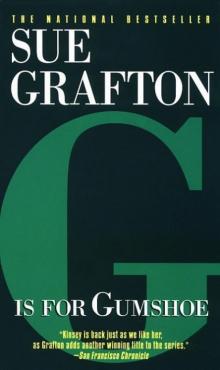 G is for GUMSHOE
G is for GUMSHOE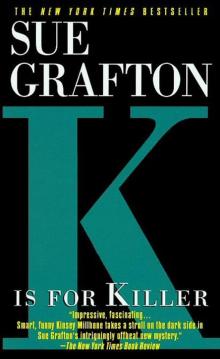 K is for KILLER
K is for KILLER S is for SILENCE
S is for SILENCE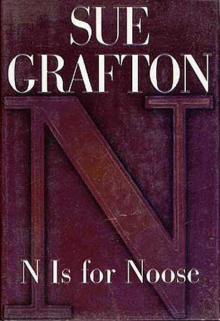 N is for NOOSE
N is for NOOSE D is for DEADBEAT
D is for DEADBEAT V is for Vengeance
V is for Vengeance U is for Undertow
U is for Undertow W Is for Wasted km-23
W Is for Wasted km-23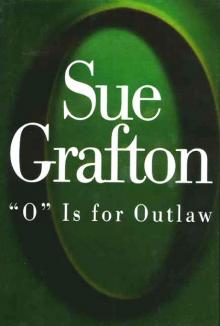 O is for OUTLAW
O is for OUTLAW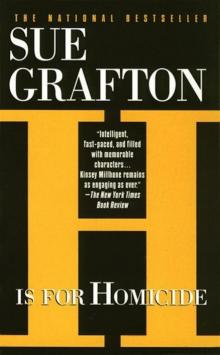 H is for HOMICIDE
H is for HOMICIDE Sue Grafton Novel Collection
Sue Grafton Novel Collection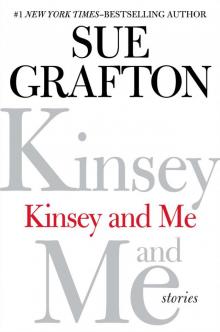 Kinsey and Me
Kinsey and Me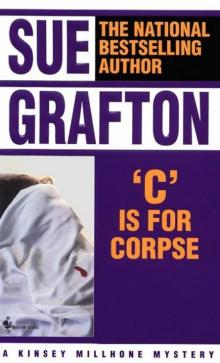 C is for CORPSE
C is for CORPSE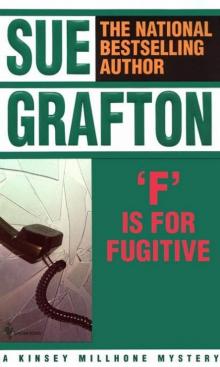 F is for FUGITIVE
F is for FUGITIVE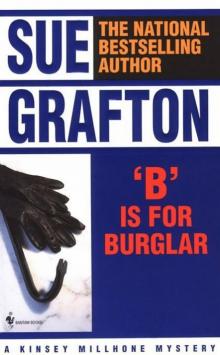 B is for BURGLAR
B is for BURGLAR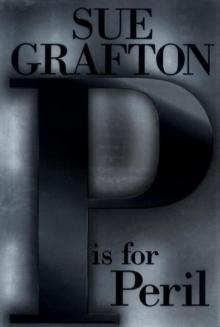 P is for PERIL
P is for PERIL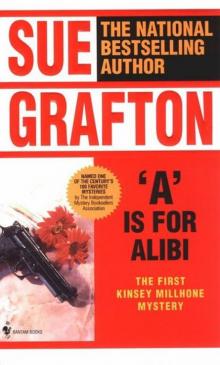 A is for ALIBI
A is for ALIBI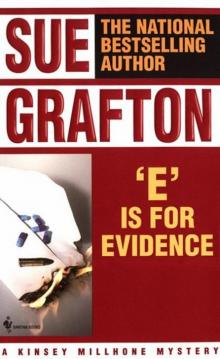 E is for EVIDENCE
E is for EVIDENCE J is for JUDGMENT
J is for JUDGMENT Q is for QUARRY
Q is for QUARRY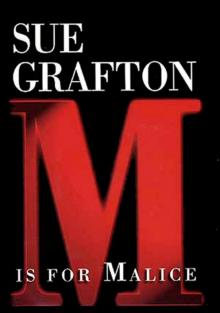 M is for MALICE
M is for MALICE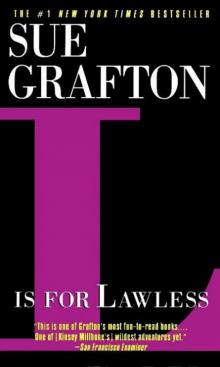 L is for LAWLESS
L is for LAWLESS